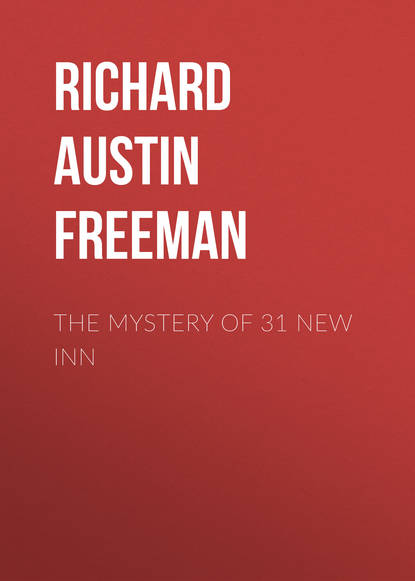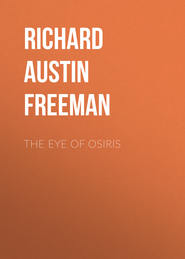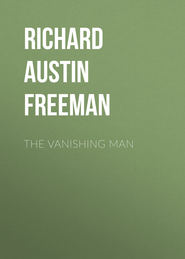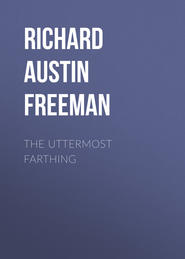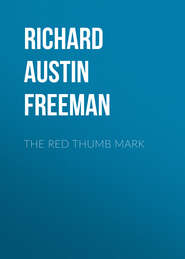По всем вопросам обращайтесь на: info@litportal.ru
(©) 2003-2024.
✖
The Mystery of 31 New Inn
Настройки чтения
Размер шрифта
Высота строк
Поля
He bowed solemnly, and by way of reply—in the affirmative, as I assumed—emitted another "hm—hm."
I looked at him sharply, a little nettled by his lack of manners; whereupon he opened out the lease so that it screened his face, and as I glanced at the back of the document, I was astonished to observe that it was shaking rapidly.
The fellow was actually laughing! What he found in my simple question to cause him so much amusement I was totally unable to imagine. But there it was. The tremulous movements of the document left me in no possible doubt that he was for some reason convulsed with laughter.
It was extremely mysterious. Also, it was rather embarrassing. I took out my pocket file and began to look over my notes. Then the document was lowered and I was able to get another look at the stranger's face. He was really extraordinarily like Weiss. The shaggy eyebrows, throwing the eye-sockets into shadow, gave him, in conjunction with the spectacles, the same owlish, solemn expression that I had noticed in my Kennington acquaintance; and which, by the way, was singularly out of character with the frivolous behaviour that I had just witnessed.
From time to time as I looked at him, he caught my eye and instantly averted his own, turning rather red. Apparently he was a shy, nervous man, which might account for his giggling; for I have noticed that shy or nervous people have a habit of smiling inopportunely and even giggling when embarrassed by meeting an over-steady eye. And it seemed my own eye had this disconcerting quality, for even as I looked at him, the document suddenly went up again and began to shake violently.
I stood it for a minute or two, but, finding the situation intolerably embarrassing, I rose, and brusquely excusing myself, went up to the laboratory to look for Polton and inquire at what time Thorndyke was expected home. To my surprise, however, on entering, I discovered Thorndyke himself just finishing the mounting of a microscopical specimen.
"Did you know that there is some one below waiting to see you?" I asked.
"Is it anyone you know?" he inquired.
"No," I answered. "It is a red-nosed, sniggering fool in spectacles. He has got a lease or a deed or some other sort of document which he has been using to play a sort of idiotic game of Peep-Bo! I couldn't stand him, so I came up here."
Thorndyke laughed heartily at my description of his client.
"What are you laughing at?" I asked sourly; at which he laughed yet more heartily and added to the aggravation by wiping his eyes.
"Our friend seems to have put you out," he remarked.
"He put me out literally. If I had stayed much longer I should have punched his head."
"In that case," said Thorndyke, "I am glad you didn't stay. But come down and let me introduce you."
"No, thank you. I've had enough of him for the present."
"But I have a very special reason for wishing to introduce you. I think you will get some information from him that will interest you very much; and you needn't quarrel with a man for being of a cheerful disposition."
"Cheerful be hanged!" I exclaimed. "I don't call a man cheerful because he behaves like a gibbering idiot."
To this Thorndyke made no reply but a broad and appreciative smile, and we descended to the lower floor. As we entered the room, the stranger rose, and, glancing in an embarrassed way from one of us to the other, suddenly broke out into an undeniable snigger. I looked at him sternly, and Thorndyke, quite unmoved by his indecorous behaviour, said in a grave voice:
"Let me introduce you, Jervis; though I think you have met this gentleman before."
"I think not," I said stiffly.
"Oh yes, you have, sir," interposed the stranger; and, as he spoke, I started; for the voice was uncommonly like the familiar voice of Polton.
I looked at the speaker with sudden suspicion. And now I could see that the flaxen hair was a wig; that the beard had a decidedly artificial look, and that the eyes that beamed through the spectacles were remarkably like the eyes of our factotum. But the blotchy face, the bulbous nose and the shaggy, overhanging eyebrows were alien features that I could not reconcile with the personality of our refined and aristocratic-looking little assistant.
"Is this a practical joke?" I asked.
"No," replied Thorndyke; "it is a demonstration. When we were talking this morning it appeared to me that you did not realize the extent to which it is possible to conceal identity under suitable conditions of light. So I arranged, with Polton's rather reluctant assistance, to give you ocular evidence. The conditions are not favourable—which makes the demonstration more convincing. This is a very well-lighted room and Polton is a very poor actor; in spite of which it has been possible for you to sit opposite him for several minutes and look at him, I have no doubt, very attentively, without discovering his identity. If the room had been lighted only with a candle, and Polton had been equal to the task of supporting his make-up with an appropriate voice and manner, the deception would have been perfect."
"I can see that he has a wig on, quite plainly," said I.
"Yes; but you would not in a dimly lighted room. On the other hand, if Polton were to walk down Fleet Street at mid-day in this condition, the make-up would be conspicuously evident to any moderately observant passer-by. The secret of making up consists in a careful adjustment to the conditions of light and distance in which the make-up is to be seen. That in use on the stage would look ridiculous in an ordinary room; that which would serve in an artificially lighted room would look ridiculous out of doors by daylight."
"Is any effective make-up possible out of doors in ordinary daylight?" I asked.
"Oh, yes," replied Thorndyke. "But it must be on a totally different scale from that of the stage. A wig, and especially a beard or moustache, must be joined up at the edges with hair actually stuck on the skin with transparent cement and carefully trimmed with scissors. The same applies to eyebrows; and alterations in the colour of the skin must be carried out much more subtly. Polton's nose has been built up with a small covering of toupée-paste, the pimples on the cheeks produced with little particles of the same material; and the general tinting has been done with grease-paint with a very light scumble of powder colour to take off some of the shine. This would be possible in outdoor make-up, but it would have to be done with the greatest care and delicacy; in fact, with what the art-critics call 'reticence.' A very little make-up is sufficient and too much is fatal. You would be surprised to see how little paste is required to alter the shape of the nose and the entire character of the face."
At this moment there came a loud knock at the door; a single, solid dab of the knocker which Polton seemed to recognize, for he ejaculated:
"Good lord, sir! That'll be Wilkins, the cabman! I'd forgotten all about him. Whatever's to be done?"
He stared at us in ludicrous horror for a moment or two, and then, snatching off his wig, beard and spectacles, poked them into a cupboard. But his appearance was now too much even for Thorndyke—who hastily got behind him—for he had now resumed his ordinary personality—but with a very material difference.
"Oh, it's nothing to laugh at, sir," he exclaimed indignantly as I crammed my handkerchief into my mouth. "Somebody's got to let him in, or he'll go away."
"Yes; and that won't do," said Thorndyke. "But don't worry, Polton. You can step into the office. I'll open the door."
Polton's presence of mind, however, seemed to have entirely forsaken him, for he only hovered irresolutely in the wake of his principal. As the door opened, a thick and husky voice inquired:
"Gent of the name of Polton live here?"
"Yes, quite right," said Thorndyke. "Come in. Your name is Wilkins, I think?"
"That's me, sir," said the voice; and in response to Thorndyke's invitation, a typical "growler" cabman of the old school, complete even to imbricated cape and dangling badge, stalked into the room, and glancing round with a mixture of embarrassment and defiance, suddenly fixed on Polton's nose a look of devouring curiosity.
"Here you are, then," Polton remarked nervously.
"Yus," replied the cabman in a slightly hostile tone. "Here I am. What am I wanted to do? And where's this here Mr. Polton?"
"I am Mr. Polton," replied our abashed assistant.
"Well, it's the other Mr. Polton what I want," said the cabman, with his eyes still riveted on the olfactory prominence.
"There isn't any other Mr. Polton," our subordinate replied irritably. "I am the—er—person who spoke to you in the shelter."
"Are you though?" said the manifestly incredulous cabby. "I shouldn't have thought it; but you ought to know. What do you want me to do?"
"We want you," said Thorndyke, "to answer one or two questions. And the first one is, Are you a teetotaller?"
The question being illustrated by the production of a decanter, the cabman's dignity relaxed somewhat.
"I ain't bigoted," said he.
"Then sit down and mix yourself a glass of grog. Soda or plain water?"
"May as well have all the extries," replied the cabman, sitting down and grasping the decanter with the air of a man who means business. "Per'aps you wouldn't mind squirtin' out the soda, sir, bein' more used to it."
While these preliminaries were being arranged, Polton silently slipped out of the room, and when our visitor had fortified himself with a gulp of the uncommonly stiff mixture, the examination began.
"Your name, I think, is Wilkins?" said Thorndyke.
I looked at him sharply, a little nettled by his lack of manners; whereupon he opened out the lease so that it screened his face, and as I glanced at the back of the document, I was astonished to observe that it was shaking rapidly.
The fellow was actually laughing! What he found in my simple question to cause him so much amusement I was totally unable to imagine. But there it was. The tremulous movements of the document left me in no possible doubt that he was for some reason convulsed with laughter.
It was extremely mysterious. Also, it was rather embarrassing. I took out my pocket file and began to look over my notes. Then the document was lowered and I was able to get another look at the stranger's face. He was really extraordinarily like Weiss. The shaggy eyebrows, throwing the eye-sockets into shadow, gave him, in conjunction with the spectacles, the same owlish, solemn expression that I had noticed in my Kennington acquaintance; and which, by the way, was singularly out of character with the frivolous behaviour that I had just witnessed.
From time to time as I looked at him, he caught my eye and instantly averted his own, turning rather red. Apparently he was a shy, nervous man, which might account for his giggling; for I have noticed that shy or nervous people have a habit of smiling inopportunely and even giggling when embarrassed by meeting an over-steady eye. And it seemed my own eye had this disconcerting quality, for even as I looked at him, the document suddenly went up again and began to shake violently.
I stood it for a minute or two, but, finding the situation intolerably embarrassing, I rose, and brusquely excusing myself, went up to the laboratory to look for Polton and inquire at what time Thorndyke was expected home. To my surprise, however, on entering, I discovered Thorndyke himself just finishing the mounting of a microscopical specimen.
"Did you know that there is some one below waiting to see you?" I asked.
"Is it anyone you know?" he inquired.
"No," I answered. "It is a red-nosed, sniggering fool in spectacles. He has got a lease or a deed or some other sort of document which he has been using to play a sort of idiotic game of Peep-Bo! I couldn't stand him, so I came up here."
Thorndyke laughed heartily at my description of his client.
"What are you laughing at?" I asked sourly; at which he laughed yet more heartily and added to the aggravation by wiping his eyes.
"Our friend seems to have put you out," he remarked.
"He put me out literally. If I had stayed much longer I should have punched his head."
"In that case," said Thorndyke, "I am glad you didn't stay. But come down and let me introduce you."
"No, thank you. I've had enough of him for the present."
"But I have a very special reason for wishing to introduce you. I think you will get some information from him that will interest you very much; and you needn't quarrel with a man for being of a cheerful disposition."
"Cheerful be hanged!" I exclaimed. "I don't call a man cheerful because he behaves like a gibbering idiot."
To this Thorndyke made no reply but a broad and appreciative smile, and we descended to the lower floor. As we entered the room, the stranger rose, and, glancing in an embarrassed way from one of us to the other, suddenly broke out into an undeniable snigger. I looked at him sternly, and Thorndyke, quite unmoved by his indecorous behaviour, said in a grave voice:
"Let me introduce you, Jervis; though I think you have met this gentleman before."
"I think not," I said stiffly.
"Oh yes, you have, sir," interposed the stranger; and, as he spoke, I started; for the voice was uncommonly like the familiar voice of Polton.
I looked at the speaker with sudden suspicion. And now I could see that the flaxen hair was a wig; that the beard had a decidedly artificial look, and that the eyes that beamed through the spectacles were remarkably like the eyes of our factotum. But the blotchy face, the bulbous nose and the shaggy, overhanging eyebrows were alien features that I could not reconcile with the personality of our refined and aristocratic-looking little assistant.
"Is this a practical joke?" I asked.
"No," replied Thorndyke; "it is a demonstration. When we were talking this morning it appeared to me that you did not realize the extent to which it is possible to conceal identity under suitable conditions of light. So I arranged, with Polton's rather reluctant assistance, to give you ocular evidence. The conditions are not favourable—which makes the demonstration more convincing. This is a very well-lighted room and Polton is a very poor actor; in spite of which it has been possible for you to sit opposite him for several minutes and look at him, I have no doubt, very attentively, without discovering his identity. If the room had been lighted only with a candle, and Polton had been equal to the task of supporting his make-up with an appropriate voice and manner, the deception would have been perfect."
"I can see that he has a wig on, quite plainly," said I.
"Yes; but you would not in a dimly lighted room. On the other hand, if Polton were to walk down Fleet Street at mid-day in this condition, the make-up would be conspicuously evident to any moderately observant passer-by. The secret of making up consists in a careful adjustment to the conditions of light and distance in which the make-up is to be seen. That in use on the stage would look ridiculous in an ordinary room; that which would serve in an artificially lighted room would look ridiculous out of doors by daylight."
"Is any effective make-up possible out of doors in ordinary daylight?" I asked.
"Oh, yes," replied Thorndyke. "But it must be on a totally different scale from that of the stage. A wig, and especially a beard or moustache, must be joined up at the edges with hair actually stuck on the skin with transparent cement and carefully trimmed with scissors. The same applies to eyebrows; and alterations in the colour of the skin must be carried out much more subtly. Polton's nose has been built up with a small covering of toupée-paste, the pimples on the cheeks produced with little particles of the same material; and the general tinting has been done with grease-paint with a very light scumble of powder colour to take off some of the shine. This would be possible in outdoor make-up, but it would have to be done with the greatest care and delicacy; in fact, with what the art-critics call 'reticence.' A very little make-up is sufficient and too much is fatal. You would be surprised to see how little paste is required to alter the shape of the nose and the entire character of the face."
At this moment there came a loud knock at the door; a single, solid dab of the knocker which Polton seemed to recognize, for he ejaculated:
"Good lord, sir! That'll be Wilkins, the cabman! I'd forgotten all about him. Whatever's to be done?"
He stared at us in ludicrous horror for a moment or two, and then, snatching off his wig, beard and spectacles, poked them into a cupboard. But his appearance was now too much even for Thorndyke—who hastily got behind him—for he had now resumed his ordinary personality—but with a very material difference.
"Oh, it's nothing to laugh at, sir," he exclaimed indignantly as I crammed my handkerchief into my mouth. "Somebody's got to let him in, or he'll go away."
"Yes; and that won't do," said Thorndyke. "But don't worry, Polton. You can step into the office. I'll open the door."
Polton's presence of mind, however, seemed to have entirely forsaken him, for he only hovered irresolutely in the wake of his principal. As the door opened, a thick and husky voice inquired:
"Gent of the name of Polton live here?"
"Yes, quite right," said Thorndyke. "Come in. Your name is Wilkins, I think?"
"That's me, sir," said the voice; and in response to Thorndyke's invitation, a typical "growler" cabman of the old school, complete even to imbricated cape and dangling badge, stalked into the room, and glancing round with a mixture of embarrassment and defiance, suddenly fixed on Polton's nose a look of devouring curiosity.
"Here you are, then," Polton remarked nervously.
"Yus," replied the cabman in a slightly hostile tone. "Here I am. What am I wanted to do? And where's this here Mr. Polton?"
"I am Mr. Polton," replied our abashed assistant.
"Well, it's the other Mr. Polton what I want," said the cabman, with his eyes still riveted on the olfactory prominence.
"There isn't any other Mr. Polton," our subordinate replied irritably. "I am the—er—person who spoke to you in the shelter."
"Are you though?" said the manifestly incredulous cabby. "I shouldn't have thought it; but you ought to know. What do you want me to do?"
"We want you," said Thorndyke, "to answer one or two questions. And the first one is, Are you a teetotaller?"
The question being illustrated by the production of a decanter, the cabman's dignity relaxed somewhat.
"I ain't bigoted," said he.
"Then sit down and mix yourself a glass of grog. Soda or plain water?"
"May as well have all the extries," replied the cabman, sitting down and grasping the decanter with the air of a man who means business. "Per'aps you wouldn't mind squirtin' out the soda, sir, bein' more used to it."
While these preliminaries were being arranged, Polton silently slipped out of the room, and when our visitor had fortified himself with a gulp of the uncommonly stiff mixture, the examination began.
"Your name, I think, is Wilkins?" said Thorndyke.





